What is a conditional sentence? And what is an “if clause?” The “If clause” is a conditional sentence that discusses a situation and presents the consequences of the situation.
Such sentences have two main parts which are the “if clause” and the main clause. Here is an example to understand how the “if clause” functions in a sentence.
Example:
If it snows, I will wear my hoodie to visit the shopping mall.
Here, the “if it snows” is the “if clause” and the “I will wear my hoodie to visit the shopping mall” is the main clause. The “if clause” in the sentence introduces a situation or a condition and the consequence or result of that condition is the main clause.
Another example:
If we start early, we will reach the theater on time.
Here, in this example, the “if we start early” is the “if clause” and the “we will reach the theater on time” is the main clause. In this example, starting early (condition) will provide the result of reaching the theatre on time.
Remember, in the “if clause”, a comma is used when the “if” is used at the start of the sentence. On the other hand, if the “if clause” is used in the second part of the sentence then a comma is not required. For example, we will cancel the trip if it rains.
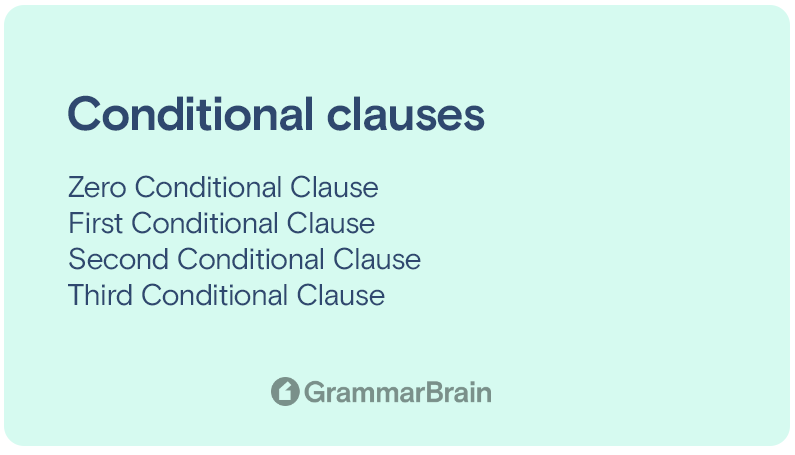
Different types of conditional clauses (If Clause)
The “if clause” is divided into four main types. They are:
- Zero Conditional Clause
- First Conditional Clause
- Second Conditional Clause
- Third Conditional Clause
Let’s have a look at each one of them in detail with examples.
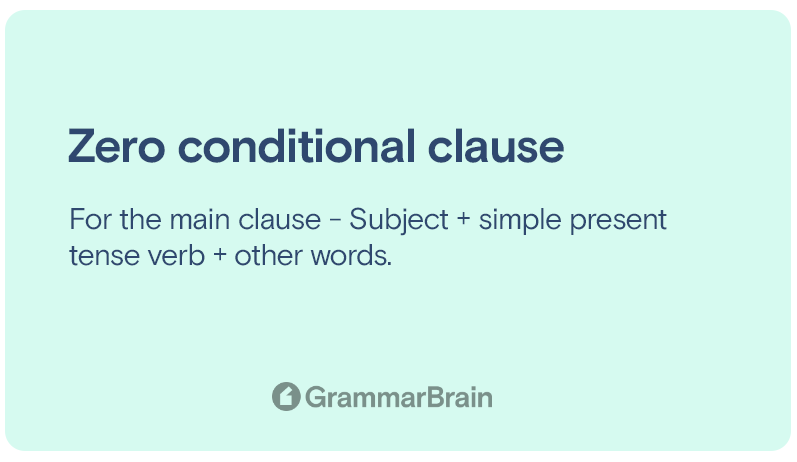
What is Zero Conditional Clause?
This clause is used to talk about facts. It is used to describe things that will always take place in certain situations.
Here is the structure of the zero conditional clauses.
For “If clause” – If + subject + simple present tense verb + other words.
For the main clause – Subject + simple present tense verb + other words.
Examples
- If it rains, the ground gets wet. In this sentence, it is a fact that when it rains, the ground certainly gets wet.
- Fish can’t survive if there is no water. This is a fact that without water fish cannot live.
- If you heat ice, it melts.
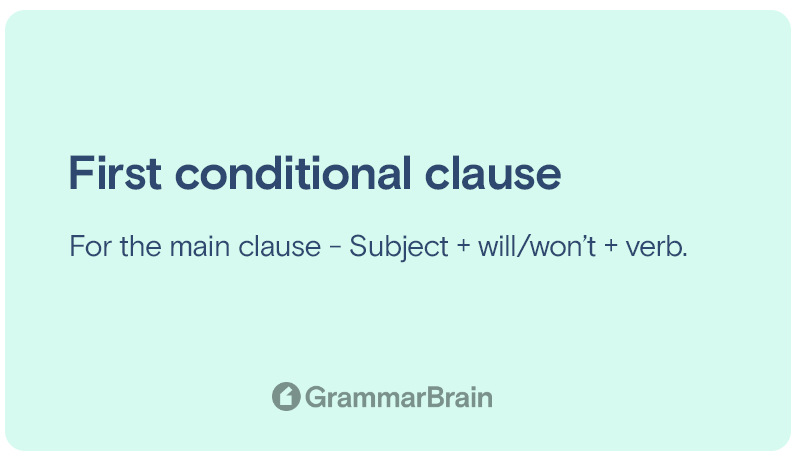
What is the First Conditional Clause?
This conditional clause discusses the possibilities of a situation that is likely to take place in the future.
Here is the structure of the first conditional clause.
For “if clause” – If + subject + simple present tense verb.
For the main clause – Subject + will/won’t + verb.
Examples
- If you exercise now, you will lose weight in the coming months. Here, the sentence describes a situation where exercising now will lead to loss of weight in the future.
- If you fail to submit your assignment on time, you will lose marks for a late submission. In this case, the late submission of the assignment will likely result in a loss of marks.
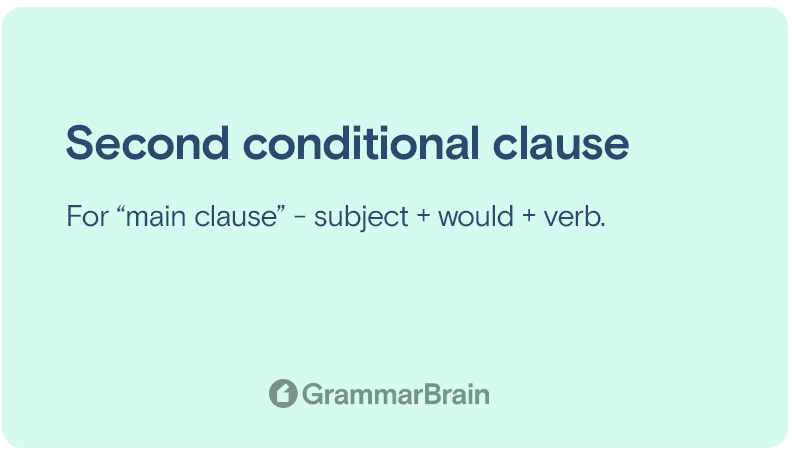
What is the Second Conditional Clause?
The second conditional cause describes hypothetical situations and presents the consequences of the situation. It talks about situations that are unlikely to take place.
Here is the structure.
For “If clause” – If + subject + simple past tense.
For “main clause” – subject + would + verb.
Examples
- If we won the match, I would win the man of the match. Here, the person is imagining something which is not going to happen.
- If I stood for elections, I would win the elections.
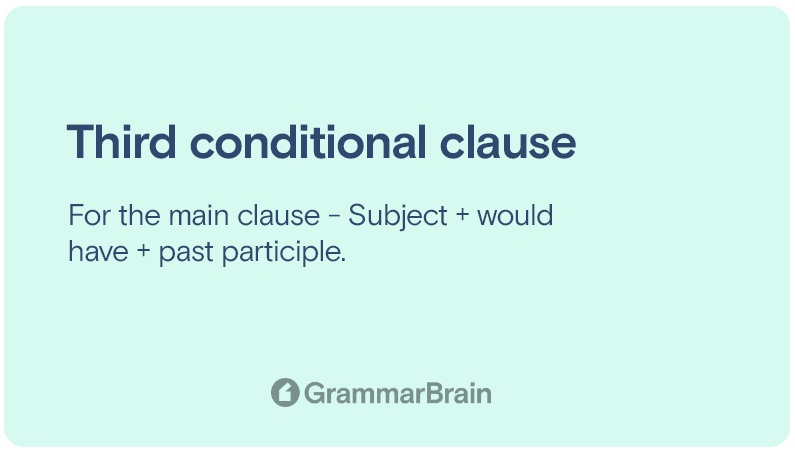
What is the Third Conditional Clause?
This clause describes an imaginary situation in the past that did not take place.
Here is the structure of the third conditional clause.
For the “If clause” – If + subject + past perfect verb.
For the main clause – Subject + would have + past participle.
Examples
- If she had studied hard, she would have passed the exam. In this example, the girl had the opportunity to study hard but it did not happen. If that had happened, the girl would have passed the exam.
- If you had informed me about the school play, I would have attended the play.
- If you had invited me to the party, I would have come.
FAQs
Can I write negative sentences with if clause?
Yes, the “if clause” is also used for constructing negative sentences. Here are a few examples.
- If he does not sleep at night, he will feel exhausted the next day.
- If you had not prepared for the exam, you would have failed the exam.
- If he doesn’t work hard, he will not get a promotion.
- If I don’t wake up early, I will not reach the office on time.
How many types of conditional clauses are there?
There are four types of conditional clauses which are:
- Zero Conditional Clause
- First Or First Type Conditional Clause
- Second Or Second Type Conditional Clause
- Third Or Third Type Conditional Clause
Sources
- Zero Conditional | Continuing Studies at UVic
- First Conditional | Continuing Studies at UVic
- The Third Conditional – Wall Street English
- Conditional sentences, if-clauses type I, II, III
- Conditional and IF clauses – English Grammar
- Conditional Sentences and How They’re Used | Grammarly Blog
Inside this article
Fact checked:
Content is rigorously reviewed by a team of qualified and experienced fact checkers. Fact checkers review articles for factual accuracy, relevance, and timeliness. Learn more.
Core lessons
Glossary
- Abstract Noun
- Accusative Case
- Anecdote
- Antonym
- Active Sentence
- Adverb
- Adjective
- Allegory
- Alliteration
- Adjective Clause
- Adjective Phrase
- Ampersand
- Anastrophe
- Adverbial Clause
- Appositive Phrase
- Clause
- Compound Adjective
- Complex Sentence
- Compound Words
- Compound Predicate
- Common Noun
- Comparative Adjective
- Comparative and Superlative
- Compound Noun
- Compound Subject
- Compound Sentence
- Copular Verb
- Collective Noun
- Colloquialism
- Conciseness
- Consonance
- Conditional
- Concrete Noun
- Conjunction
- Conjugation
- Conditional Sentence
- Comma Splice
- Correlative Conjunction
- Coordinating Conjunction
- Coordinate Adjective
- Cumulative Adjective
- Dative Case
- Determiner
- Declarative Sentence
- Declarative Statement
- Direct Object Pronoun
- Direct Object
- Diction
- Diphthong
- Dangling Modifier
- Demonstrative Pronoun
- Demonstrative Adjective
- Direct Characterization
- Definite Article
- Doublespeak
- False Dilemma Fallacy
- Future Perfect Progressive
- Future Simple
- Future Perfect Continuous
- Future Perfect
- First Conditional
- Irregular Adjective
- Irregular Verb
- Imperative Sentence
- Indefinite Article
- Intransitive Verb
- Introductory Phrase
- Indefinite Pronoun
- Indirect Characterization
- Interrogative Sentence
- Intensive Pronoun
- Inanimate Object
- Indefinite Tense
- Infinitive Phrase
- Interjection
- Intensifier
- Infinitive
- Indicative Mood
- Participle
- Parallelism
- Prepositional Phrase
- Past Simple Tense
- Past Continuous Tense
- Past Perfect Tense
- Past Progressive Tense
- Present Simple Tense
- Present Perfect Tense
- Personal Pronoun
- Personification
- Persuasive Writing
- Parallel Structure
- Phrasal Verb
- Predicate Adjective
- Predicate Nominative
- Phonetic Language
- Plural Noun
- Punctuation
- Punctuation Marks
- Preposition
- Preposition of Place
- Parts of Speech
- Possessive Adjective
- Possessive Determiner
- Possessive Case
- Possessive Noun
- Proper Adjective
- Proper Noun
- Present Participle
- Prefix
- Predicate



